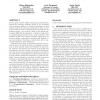Free Online Productivity Tools
i2Speak
i2Symbol
i2OCR
iTex2Img
iWeb2Print
iWeb2Shot
i2Type
iPdf2Split
iPdf2Merge
i2Bopomofo
i2Arabic
i2Style
i2Image
i2PDF
iLatex2Rtf
Sci2ools
121
click to vote
ATAL
2009
Springer
2009
Springer
Operational semantics of goal models in adaptive agents
Several agent-oriented software engineering methodologies address the emerging challenges posed by the increasing need of adaptive software. A common denominator of such methodologies is the paramount importance of the concept of goal model in order to understand the requirements of a software system. Goal models consist of goal graphs repg AND/OR-decomposition of abstract goals down to operationalisable leaf-level goals. Goal models are used primarily in the earlier phases of software engineering, for social modelling, requirements elicitation and analysis, to concretise abstract objectives, to detail them and to capture alternatives for their satisfaction. Although various agent programming languages incorporate the notion of (leaf-level) goal as a language construct, none of them natively support the definition of goal models. However, the semantic gap between goal models used at design-time and the concept of goal used at implementation and execution time represent a limitation e...
Artificial Intelligence | ATAL 2009 | Design-time Goal Models | Goal Models | Software Engineering |
Related Content
| Added | 26 May 2010 |
| Updated | 26 May 2010 |
| Type | Conference |
| Year | 2009 |
| Where | ATAL |
| Authors | Mirko Morandini, Loris Penserini, Anna Perini |
Comments (0)

